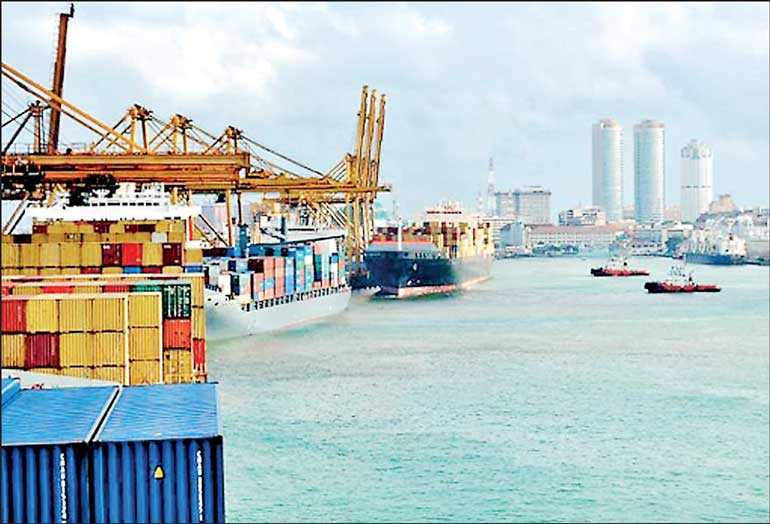Thursday Feb 19, 2026
Thursday Feb 19, 2026
Monday, 11 January 2021 00:00 - - {{hitsCtrl.values.hits}}

In Sri Lanka, the freight and logistics industry has a long way to go. It needs to go beyond the present working environment, and it needs to embrace markets and customers beyond Sri Lanka, to build scale and critical mass to be in par with mid-sized global companies that can provide effective and efficient solutions for international clients that are looking for new inventory control and delivery solutions
As a derived demand service industry, freight forwarding and logistics, has always been a key component of the global supply chain that connected trade with markets. Mostly the services rendered by the logistics industry is not visible as it is considered a transportation solution instead of a solution  provider for competitiveness, efficiency and bringing in agility and flexibility for exports and imports of the world trade.
provider for competitiveness, efficiency and bringing in agility and flexibility for exports and imports of the world trade.
The year 2020, can be considered a watershed moment for the logistics industry, as suddenly the 200 countries and territories of the world found themselves taken by surprise with COVID-19 disrupting trade. The world realised how important the role played by the logistics industry over a period, where the global village connected by various means of commerce was successfully running due to efficient logistics. COVID-19, instantaneously broke global supply chains, creating shortages of raw materials, intermediary goods, packing material and finished goods in different markets of the world. It is indeed, recognised that global freight and logistics companies were the immediate lifelines that resurrected trade and supply chains within a very short period to fight the pandemic destructions. This ensured, that factories started work, retailers started opening and consumers were back in the market to bring stability to the global economy.
What lies ahead for freight forwarding and logistics industry beyond 2021?
SLFFA is of the opinion that there is identified inefficiencies exposed with COVID-19 and a new market environment that will lead to casualties across the freight forwarding industry. This is common to all businesses that would need to readjust its logistics efficiency to survive the new norms set by the pandemic. The 2021 year and beyond is new horizon for all businesses to survive, grow and expand. New lessons have been taught world around in managing supply chains. A new world order in trade is taking place. Probable market shifts are on the cards and new supply chains will emerge as a result. The following trends are going to define winners and losers for the freight forwarding industry as it evolves with the pandemic:
Competence
A new era would be dawn where customers would require innovative and leaner solutions in the supply chain. The logistics and freight forwarding industry will play a key role in achieving these new models of business. Therefore, large workforces with physical offices will be replaced by smaller but highly professional organisations that will have the competence to be innovative to bring in new solutions to the marketplace. Therefore, qualified, and skilled personnel will be a norm for the industry if they are to compete globally.
Digitalisation and technology adaptation
COVID-19, fast tracked the available digital solutions and cut through many layers of processes and bureaucracy in making the supply chains work in a new controlled environment and lockdowns constantly being enforced by governments. This suddenly exposed the need for massive productivity improvement across countries that were earlier reluctant to accept and absorb technology as a competitive tool. It was rather a forced entry where choice was to accept technology or shut down business operations. The positive change of gear in 2021 would be that the freight forwarding, and logistics companies would now try to enhance this newfound efficiency and will have to increase the focus on digital automated solutions to be competitive. This will make the difference between survival and downfall of companies.
Human resources suitable for 4th industrial revolution
The logistics industry will see a re-engineering of its structures, both in terms of employment and physical presence. Therefore, it is forecasted that the industry will consolidate and operate leaner structures to provide superior services to the global trading community. The tools of the 4th industrial revolution will be the infrastructure instead of physical offices and traditional workplace where online activity will be demanded by the marketplace. The growth of B2C business will accelerate and e-commerce supply chains are going to be a significant role of the freight forwarder.
Teamwork, agility, and flexibility
Among the human resource skills, the freight and logistics industry will need greater teamwork, agility, and flexibility to compete within a country, regionally and globally to provide supply chain solutions to customers who are also facing new challenges in the marketplace.
May it be consumer behaviour, sourcing patterns or major network changes of shipping companies and the airline industry. Quick and agile solutions, speed of communication and customer relationships will be some of the key factors that would influence the new norm of post COVID-19 environments for superior logistics solutions.
Making Sri Lanka prepared to face the future
In Sri Lanka, the freight and logistics industry has a long way to go. It needs to go beyond the present working environment, and it needs to embrace markets and customers beyond Sri Lanka, to build scale and critical mass to be in par with mid-sized global companies that can provide effective and efficient solutions for international clients that are looking for new inventory control and delivery solutions. Certainly, protectionism and unethical cut-throat competition will not be the solution, but outward looking companies that would add up the recommendations made above will have a greater chance of retaining and attracting new customers. The Sri Lankan freight forwarding fraternity needs a mindset change to embrace new opportunities and face new challenges brought upon by COVID-19. Competition needs to be built on new platforms and innovations.
Role of Government and regulators
SLFFA as a body while recommending to its members to re-look at their own structures and operational procedures, seeks government to establish correct policies to make Sri Lanka an attractive location for global logistics companies to invest, partner and create joint ventures. This would help make a true hub that would contribute to the national economy in way of greater foreign exchange flow and employment, making use of its key ports as an advantage in the Indian Ocean.
It is the responsibility of the Government to address the issues highlighted in the Global Logistics Performance Index (LPI), to correct the anomalies that hinder operations at border control institutions, may they be infrastructure, process, or legal environment. The efficiency of the Sri Lankan logistics industry can be only built if public private partnerships are expanded together. Therefore, the role of the state will be critical for Sri Lanka as a nation if it is to compete with global hubs where a level playing field has to be created across the spectrum of requirements highlighted in this article and the new standards set upon by COVID-19.